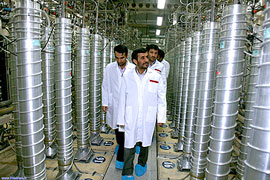US: Iran undecided on nuclear bomb
Intelligence chief tempers assertion with claim that Tehran continues to enrich uranium.

The US state department predicts that Iran could have a sufficient amount of highly enriched uranium by 2013, he said.
Israel ‘more concerned’
The US and Europe have expressed fears that Iran’s nuclear programme is geared towards the production of a bomb, while Tehran says it is only looking to generate electricity.
Israel is more concerned than the US about Iran’s nuclear programme, Blair said.
|
“Israel’s most recent understanding of the issue is that the Iranians had crossed a threshold – that is, they had the material and the knowledge, they just need to make the decision to enrich and construct a bomb” Ehud Eirad, research fellow, Harvard University |
“The Israelis are far more concerned about it, and they take more of a worst-case approach to these things from their point of view,” he said.
In order to create a nuclear arsenal, Tehran would need to enrich enough uranium, build a warhead and then install it on a long-range missile.
US intelligence agencies have concluded that “Iran has not decided to press forward on all three tracks”, Blair said.
Lieutenant Michael Maples, director of the Pentagon’s Defence Intelligence Agency (DIA), told the Senate Armed Services Committee: “We are in agreement on this.”
And “Iran will see government revenues decline in 2009 as oil prices remain at low levels. Defence spending will have to be balanced with social programmes”.
Both Maples and Blair said that Iran was boosting defences against air raids on its territory, which analysts say would be the most likely method to destroy Iran’s nuclear programme, but that does not prove Tehran is building a nuclear weapon.
The Iranian government may drop its nuclear programme for a package of “credible” incentives and “threats of intensified international scrutiny and pressures”, Blair said.
Elusive mix
Blair acknowledged in his testimony that “it is difficult to specify what such a combination [of incentives and threats] might be”.
“We assess convincing the Iranian leadership to forego the eventual development of nuclear weapons will be difficult, given the linkage many within the leadership see between nuclear weapons and Iran’s key national security and foreign policy objectives, and given Iran’s considerable effort from at least the late 1980s to 2003 to develop such weapons,” he said.
 |
| Iran says it is only looking to generate electricity with its nuclear programme [AFP] |
US intelligence agencies estimate that Iran stopped moves towards the design of a nuclear weapon in late 2003, with Tehran not resuming such work as of mid-2007, Blair said.
Ehud Eirad, a research fellow at Harvard University, said Israel and the US possesses the same facts on Iran’s nuclear work but are interpreting them differently.
“Israel is closer to Iran, its rivalry with Iran is much harsher than the United States … so it is legitmate that [different countries’] intelligence agencies, even if they have a close relationship, will have different interpretations,” Eirad told Al Jazeera.
“Israel’s most recent understanding of the issue is that the Iranians had crossed a threshold – that is, they had the material and the knowledge, they just need to make the decision to enrich and construct a bomb.”
UN meeting
The senate hearing coincided with a UN Security Council meeting, at which the US and European members continued to take a tough line on Iran’s nuclear programme.
“The United States will not waver in its determination to ensure that Iran does not obtain nuclear weapons,” Susan Rice, the US ambassador to the UN, said on Tuesday.
“But the United States also sees an opportunity, a chance for the Iranian government to demonstrate that it is willing to unclench its fist and begin a serious responsible discussion on a range of issues.”